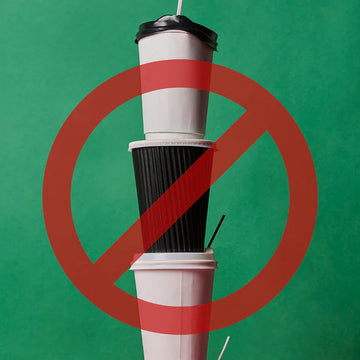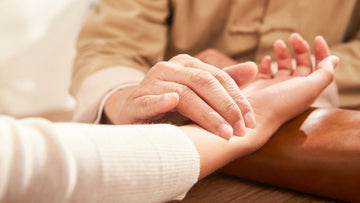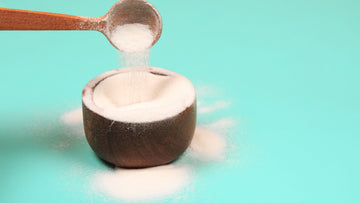

Coffee: Is it good or bad for us? You might get media whiplash trying to figure that out. The truth is, I find this subject to be as confusing as you probably do.
After all, the media certainly doesn't help clarify whether America's favorite cup of joe is going to land you in the doc's office or set you free with a clean bill of health. And when one night's news report conflicts with another's blatantly-contradictory messages, it is no wonder why so many of you shrug your shoulders in utter confusion as you refill your morning mug and get on with your day!
And with the velvety aroma and promise of energy from that caffeine jolt, you might rather just assume that there must be something to those beneficial claims... I know all about this adoration of coffee. I too was smitten and enamored with Coffea Arabica. We had our courtship during the 1990s, when I worked more than 80 hours in the emergency room and saw 30 to 40 patients a day.
I traded sleep for espresso, authentic energy for Haagen Daz coffee ice cream and normal circadian rhythms for high-speed, caffeinated adrenaline rushes. But then, my body began to communicate to me what I had been attempting to not hear -- slow down and let the natural systems assume their proper course. You can read more about how I successfully turned my health around here.
As I began to tune into my body and provide it with what it really wanted -- fresh, whole, real, unprocessed foods, sleep, relaxation, and the time to enjoy the life I had created for myself and my family -- I was able to break up with coffee and make up with my health.
You can too, and I'm going to tell you how. But first, let's discuss what makes coffee such a hot topic widely disputed in today's health circles.
While there are many controversies about coffee's role in the prevention of Parkinson's disease to breast cancer, I'm mostly interested in the conversation relating to its effect on blood sugar metabolism. If you have read my latest book, The Blood Sugar Solution, then you already know how insulin resistance and inflammation are at the core of modern-day chronic diseases. The single most important healthy habit all of us can adopt is to manage our blood sugar by decreasing the triggers that push it out of balance. Curious if coffee is one of those triggers?
As Dr. Walter C. Willet of Harvard School of Public Health says, "Coffee is an amazingly potent collection of biologically active compounds." Like any food-like substance, coffee has far-reaching effects on the body and needs to be respected as a potent drug.
Caffeine, perhaps the most widely appreciated "drug" compound in coffee, only makes up a mere 1 to 2 percent of the bean. The chlorogenic acids, caffeol, polyphenols, phytoestrogens and diterpenes are now beginning to be researched on their effects on human health and glucose metabolism as well.
In the 1980s and 1990s several prospective cohort studies were done to investigate the correlation between coffee and diabetes. Many of those studies reported that there is an inverse dose-dependent association with the risk of Type 2 diabetes. This means that for reasons still unclear, all those research studies found that the more coffee people with normal blood sugar drank, the less risk appeared for developing Type 2 diabetes. Several constituents in coffee might be responsible for these consistent findings.
Chlorogenic acid in coffee might inhibit glucose-6-phosphatase, an enzyme that regulates blood sugar metabolism in the liver. It could also be due to the indisputably-high levels of antioxidants, which have a benign effect on insulin sensitivity. Not surprisingly, the news channels then sounded the bell that coffee was protective, and we all enjoyed our cup of joe without any remorse. Until the next report.
Some curious minds wanted to know exactly who was protected. And why? How? These studies showed that in people with Type 2 diabetes coffee intake was correlated with insulin spikes and increased blood sugar after a meal. Further research has shown that the caffeine in coffee might be the culprit responsible for the secretion of higher levels of insulin from the pancreas.
Clearly higher insulin and glucose levels are not the work we want to bestow on a body healing from insulin resistance. Considering that diabesity affects nearly 1.7 billion people worldwide and growing, the nightly news now sounded the alarm of caution that perhaps our coffee habit is a detrimental addiction needing to be kicked to the curb.
I often am asked why coffee is removed from my programs. While certain populations of people may tolerate coffee and even enjoy some health benefits, it is evident that it is not for everyone.
Chances are if you are reading this either you or someone you care about is sick, inflamed, hormonally imbalanced, nutritionally-compromised, overworked, stressed out, fatigued, depressed, and toxic. Coffee is not part of the medicine required for your healing.
Here are 10 reasons why:
-
The caffeine in coffee increases catecholamines, your stress hormones. The stress response elicits cortisol and increases insulin. Insulin increases inflammation, and this makes you feel lousy.
-
Habituation to caffeine decreases insulin sensitivity, making it difficult for your cells to respond appropriately to blood sugar. High blood sugar levels lead to arterial deterioration and increased risk of mortality related to cardiovascular disease.
-
Unfiltered coffee has the highest amount of beneficial antioxidants yet also leaks the most diterpenes into your system. These diterpenes have been linked to higher levels of triglycerides, LDL and VLDL levels.
-
The helpful chlorogenic acids that may delay glucose absorption in the intestine have also been shown to increase homocysteine levels -- an indicator for increased risk of cardiovascular disease, which tends to be elevated in diabesity.
-
The acidity of coffee is associated with digestive discomfort, indigestion, heart burn, GERD and dysbiosis (imbalances in your gut flora).
-
Addiction is often an issue with coffee drinkers and makes it really difficult to rely on the body's natural source of energy. Ask any coffee drinker about how it feels to withdraw from coffee, and you will mistake their story for that of a drug addict's...
-
Associative addictions trend with coffee -- who doesn't immediately think of warm, frothy sweet cream and sugar when they picture coffee? Surely the business of coffee has inspired a culture addicted to the sugary, fatty tastes of what has become more of a meal than a drink! That morning latte is the epitome of food lacking nutrition density yet packing energy!
-
5-HIA, an organic acid and component of the neurotransmitter serotonin (the happy chemical) seen in the urine tends to be elevated in coffee drinkers, which means they may be at risk for lower levels of serotonin synthesis in the brain. Serotonin is necessary for normal sleep, bowel function, mood, and energy levels. It is a vicious cycle, as caffeine can disrupt sleep and promote anxiety and depression. We all know someone who tends to be tired, wired and over-caffeinated!
-
Elevated urinary excretion of important minerals such as calcium, magnesium and potassium have been noted in coffee drinkers. An imbalance in your electrolyte status can lead to serious systemic complications.
-
Constituents in coffee can interfere with normal drug metabolism and detoxification in the liver, making it difficult to regulate the normal detoxification process in the liver. Another issue to be aware of with coffee intake is how certain medications such as levothyroxine (thyroid) as well as tricyclic antidepressants are poorly absorbed, making symptoms curiously worse for patients.
Now what... If you think you can't cut that coffee out, think again. I did it and now I want you to feel the same level of renewal and restoration I experienced. It's a wise experiment to provide yourself a break from coffee intake and see what it feels like to live your life on your own fuel. Remove coffee and caffeine safely from your system and see how authentically energized you feel!
How to Avoid Withdrawal Symptoms
Those who consume the most caffeine, alcohol and sugar, and those who have the highest toxic load, tend to have the most difficulty initially. In any event, symptoms of withdrawal usually disappear after three or four days. It is best to slowly reduce your intake of caffeine and coffee.
-
Make sure you drink at least six to eight glasses of filtered water daily. Instead of coffee in the morning, take some warm water with freshly-squeezed lemon juice.
-
The best water to drink is water that has been passed through a filtering process. Common and inexpensive filters are available, such as carbon filters like the ones Brita makes. The best filter is a reverse osmosis filter that puts the water through a multi-step process to remove microbes, pesticides, metals, and other toxins. This can be installed under the sink. It's a great filtering system and cheaper over the long run. Avoid water in plastic bottles, which contains phthalates, a toxic petrochemical. Mineral water or still water in glass bottles is also acceptable.
-
To prevent headaches, make sure your bowels are clean. If you tend toward constipation, follow the steps to address constipation in my book The UltraSimple Diet or work with one of my nutrition coaches.
-
If you are tired, allow more time for sleep.
-
Take 1,000 mg buffered vitamin C with breakfast and dinner.
-
Make sure you exercise daily to help fight off fatigue. Even simple walking is good -- 30 minutes daily.
-
Some people rely on substituting coffee for real food. When you are hungry make sure to eat and do not let your blood sugar get low. Have some protein in the afternoon such as a handful of nuts or seeds like almonds, pecans, walnuts, or pumpkin seeds, cooked beans, or a piece of steamed or baked fish.
-
If you're irritable or have trouble sleeping, take a combination of calcium citrate 500 mg and magnesium citrate 250 mg before bed.
-
Drink 1-3 cups of green tea. The small amount of caffeine won't hurt and the antioxidants will heal.
-
Take a sauna or heat therapy in a bath. See my book The Ultra Simple Diet for how to create an UltraBath.
-
Practice pressing the pause button. Withdrawal can be stressful and research has shown that meditation and other mindful activities can help calm an overstimulated and stressed system while boosting the immune system.
-
Keep a journal and track your symptoms. Note the difference in quality of energy you experience while off of coffee.
-
Consider a complete elimination program and avoid all refined sugars, flours, caffeine, alcohol, dairy, gluten and any other addictive substance. By allowing certain triggers to stay in the diet the body stays on the vicious cycle of cravings and addictive behavior. Reset your biology by eliminating all these dietary triggers for inflammation and fatigue.
Take this quiz to find out how toxic you are.
I know this is a difficult goal, but I assure you that your body and mind will thank you. The sense of calm, clarity and restful sleep will reward you with the simple pleasures of innate health and an energy that is rightfully yours.
About the author:

Mark Hyman, MD, believes that we all deserve a life of vitality—and that we have the potential to create it for ourselves. That’s why he is dedicated to tackling the root causes of chronic disease by harnessing the power of Functional Medicine to transform healthcare. He is a practicing family physician, a ten-time #1 New York Times bestselling author, and an internationally recognized leader, speaker, educator, and advocate in his field. He is the Director of the Cleveland Clinic Center for Functional Medicine. He is also the founder and medical director of The Ultra Wellness Center, chairman of the board of the Institute for Functional Medicine, a medical editor of The Huffington Post, and has been a regular medical contributor on many television shows including CBS This Morning, the Today Show, CNN, The View, the Katie Couric show and The Dr. Oz Show.
Mark Hyman, M.D. is a practicing physician, founder of The UltraWellness Center, a four-time New York Times bestselling author, and an international leader in the field of Functional Medicine. You can follow him on Twitter, connect with him on LinkedIn, watch his videos on YouTube, become a fan on Facebook, and subscribe to his newsletter.
For more by Mark Hyman, M.D., click here. For more on personal health, click here.
Resources:
van Dam RM, Willett WC, Manson JE, Hu FB. 2006. "Coffee, caffeine, and risk of type 2 diabetes: a prospective cohort study in younger and middle-aged U.S. women." Diabetes Care (2) 398-403
Tuomilehto J, Hu G, Bidel S, et al. 2004. "Coffee Consumption and Risk of Type 2 Diabetes Mellitus Among Middle-aged Finnish Men and Women." JAMA 291: 1213-9.
Moisey LL, Kacker S, Bickerton AC, Robinson LE, Graham TE. 2008. "Caffeinated coffee consumption impairs blood glucose homeostasis in response to high and low glycemic index meals in healthy men." Am J Clin Nutr 87 (5): 1254-1261
Lane JD, Feinglos MN, Surwit, RS. 2008. "Caffeine Increases Ambulatory Glucose and Postprandial Responses in Coffee Drinkers With Type 2 Diabetes." Diabetes Care. 31(2): 221-222





